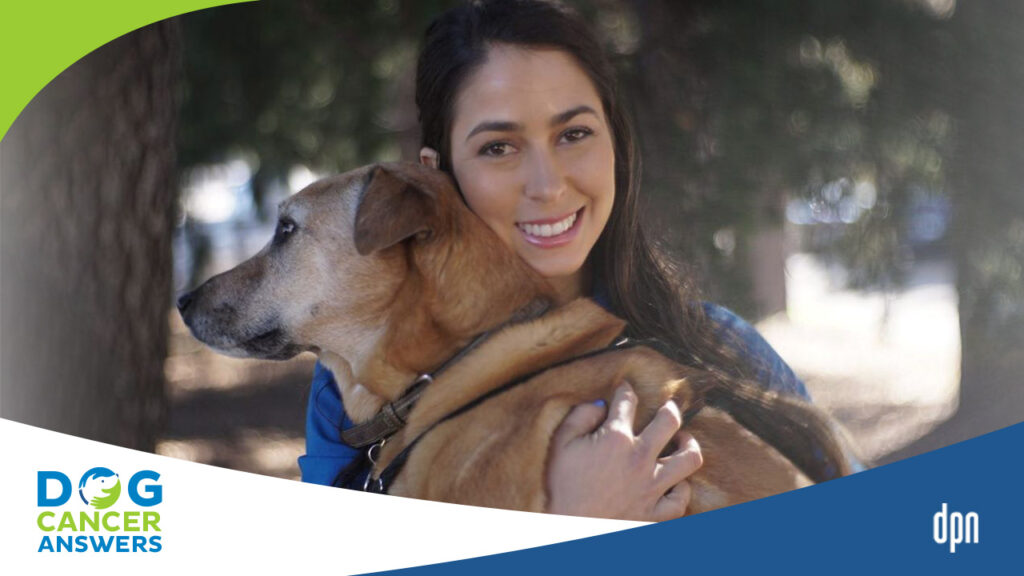>> James Jacobson: [00:00:00] Today’s show is brought to you by the bestselling book, The Dog Cancer Survival Guide: Full Spectrum Treatments to Optimize Your Dog’s Life Quality and Longevity. It’s available everywhere books are sold in both paperback and digital editions, and on the publisher’s website at DogCancerBook.com. Use coupon code podcast on that website to get 10% off The Dog Cancer Survival Guide today.
>> Dr. Demian Dressler: [00:00:30] They become like little organs, like little aliens with their own little circulatory system. And then you’re feeding the cancer, in that way.
>> Announcer: [00:00:37] Welcome to Dog Cancer Answers where we help you help your dog with cancer. Here’s your host, James Jacobson.
>> James Jacobson: [00:00:46] Hello friend. And thank you for joining us today. Today, we are taking a listener question about cold laser therapy.
And we’re asking Dr. Demian Dressler, who is co-author of The Dog Cancer Survival Guide, to help us with the answer. Joining us once again, Dr. Dressler, as we go into our listener mailbag slash voicemail bag, this is a call from Vickie in Colorado.
>> Vickie: [00:01:13] Hi, my name is Vickie and I’m in Colorado. Um, I have a dog with lung cancer and I’m treating her with a holistic vet, who’s working with me, and she has recommended that I give her a cold laser therapy treatment, which she says she’s had good luck with in the past. I know there’s some controversy regarding that, whether it makes it get worse or whether it helps. And I was wondering if any of the doctors there would have any experience or information regarding this question.
I don’t want to make my dog worse. So I’d really liked to know before I make a choice in the matter. So if somebody could help me, I would appreciate that.
>> James Jacobson: [00:01:58] So, Dr. Dressler, what are your thoughts about cold laser treatment?
>> Dr. Demian Dressler: [00:02:02] Yeah. So the problem with this is that the terminology is complicated. So. First of all there’s different cold laser units.
So the idea is a blood flow stimulation, right. And that can have pros and cons and you don’t know until you try. That’s the first thing. So what’s the argument pro? Well, the argument for the use of a circulatory enhancement therapy would be your oxygenation. Cancers do well with low oxygen environment. Then you oxygenate the space and then you, hopefully, will tend to limit the growth of the cancer cells. So that’s the argument for. Now. The problem is, is that you also, when you’ve got a well vascularized tumor, the cancer cells, first of all, do use some oxygen and they certainly use glucose, which is in the blood and they can sort of capture the circulatory pipeline in such a way that when there is increased blood flow, they are benefiting because they’re well vascularized themselves.
So they become like little organs, like little aliens with their own little circulatory system, and then you’re feeding the cancers in that way. So it really depends on how much vascular supply the cancer has. For poorly vascular tumors, increased circulation in the surrounding tissue is beneficial.
>> James Jacobson: [00:03:23] In lung cancer.
>> Dr. Demian Dressler: [00:03:25] It depends on the tumor. And you need a CT scan for that because you can’t tell the degree of vascularization around the tumor. And typically people who are doing, like veterinarians, who are only offering things like quote unquote holistic health, whatever that means, are not going to be doing things like CTs to answer these questions.
That’s the first thing. So let’s make an assumption that that’s correct, that CT is not happening and you are not going to be able to ascertain how vascular this tumor is, because if you could, if it was a highly vascular tumor, cold therapy, I would recommend against. If it’s not highly vascular, I’d recommend for.
Okay. That’s the first thing. The second thing is the cold laser therapy themselves can vary. So the penetration is a big deal. So one thing to ask your veterinarian, who’s administering this is, what’s the therapeutic range. What is the distance from the tip of the cold laser that that unit can penetrate, in the context of where this tumor is located?
That’s a very important question. Because first of all, if the answer is, I don’t know, then it’s, as far as I’m concerned, kind of quackery. If you don’t know what you’re doing, you’re not doing something properly, I believe. Because we don’t know how deep that thing goes. And you don’t know where the tumor is in the body, and you can’t answer the question is the tumor within the range of this particular device?
Well, then you’re playing around. Right. So that’s one question to ask. And then the second question to ask would be how many lung tumors have you treated with this? What type of lung tumors were they? Can you give me a number that, where it slowed the disease, stopped the disease or caused a regression? What percent about, and then can you give me a number where it had no effect?
And can you give me a number of side effects? And what are those. Ask those questions.
>> James Jacobson: [00:05:20] Those are great questions. And also the idea of like getting a CT scan. Obviously a CT scan is not all that available. And as you pointed out, probably not from a veterinarian who is using cold laser, but
>> Dr. Demian Dressler: [00:05:33] no, and you know, I don’t have a CT in my place either.
>> James Jacobson: [00:05:35] Right. But Vickie’s in Colorado.
>> Dr. Demian Dressler: [00:05:37] Right, so you can do that, and some people don’t want to do that for a variety of reasons. I get it. That’s fine. But that tool will help you answer the question about the degree of vascularity in there.
>> James Jacobson: [00:05:46] Okay.
>> Dr. Demian Dressler: [00:05:47] Which is related to the question that was asked whether or not to use it, but very fundamentally, since that information may not be available, I would be asking the other questions that are very specific, and see what the answers are. You’ll immediately get an idea because if the veterinarian is starts getting sort of, uhhhhhhhhh, that is telling. Because it means they don’t, they don’t, either they don’t know, okay, and usually that’s connected with, I’m not quite confident. And that’s useful to know.
And particularly the question, what are the side effects, exactly. And how frequently do they come up?
>> James Jacobson: [00:06:26] So is cold laser something that you would ever consider using?
>> Dr. Demian Dressler: [00:06:30] I’ve tried it. I think it’s generally a bit Mickey Mouse for cancer treatments. I am not impressed at all with it. Some little sensitive, usually white dogs where you’re looking at me, cause I have a Maltese, yeah?
No, really, little white dog, little white dogs with orthopedic problems benefit from cold laser.
I’m kidding with white, but little sensitive dogs where, when you put it on a leg, the therapeutic range of the device can penetrate the little itty-bitty toothpick leg. The dog’s sensitive, so it can feel the difference. Yeah.
>> James Jacobson: [00:07:09] Okay,
>> Dr. Demian Dressler: [00:07:09] Cold laser makes sense with those guys. You try to put a cold laser on the back of an Am Staff … Trying to get to it’s disk, it’s like that’s not happening.
>> James Jacobson: [00:07:18] OK, but again, it’s not really designed, it’s not commonly used for cancer.
>> Dr. Demian Dressler: [00:07:22] No, not as far as I know. No. And I’ve, I’ve tried it on myself too. I wasn’t impressed.
>> James Jacobson: [00:07:29] But you weren’t using it for cancer?
>> Dr. Demian Dressler: [00:07:30] No.
>> James Jacobson: [00:07:31] Okay. Well, Dr. Dressler, thank you, Vickie, thank you for your call and thank you so much.
>> Dr. Demian Dressler: [00:07:37] Thank you.
>> James Jacobson: [00:07:39] And thank you for listening to Dog Cancer Answers.
I want to let you know that our team works very hard to prepare the show notes for each and every episode. So please check them out in your podcast app. There’s lots of useful information and resources. The notes are in your podcast app or you can find them on our website at dogcanceranswers.com. Also in terms of really helpful things, if you have a dog with cancer, we have a sensational private support group. It’s on Facebook and you can find it and join it for free, by going to this URL it’s dogcancersupport.com. That’s dogcancersupport.com, and it will redirect you to our private Facebook group. If you have a question for one of our veterinarians, just like Vickie did today, you can get your question answered on a future podcast. Just call our Listener Line, that phone number is (808) 868-3200. Again, (808) 868-3200, and leave a message. Be sure to subscribe to Dog Cancer Answers and follow this podcast in your podcast app of choice so that you never miss an episode. Again, thanks for hitting the play button today. Until next time, I’m James Jacobson, and from all of us here at Dog Podcast Network, we wish you and your dog a very warm aloha.
>> Announcer: [00:09:13] Thank you for listening to Dog Cancer Answers. If you’d like to connect, please visit our website at dogcanceranswers.com or call our Listener Line at (808) 868-3200. And here’s a friendly reminder that you probably already know: this podcast is provided for informational and educational purposes only.
It’s not meant to take the place at the advice you receive from your dog’s veterinarian. Only veterinarians who examine your dog can give you veterinary advice or diagnose your dog’s medical condition. Your reliance on the information you hear on this podcast is solely at your own risk. If your dog has a specific health problem, contact your veterinarian.
Also, please keep in mind that veterinary information can change rapidly. Therefore, some information may be out of date. Dog Cancer Answers is a presentation of Maui Media in association with Dog Podcast Network.







